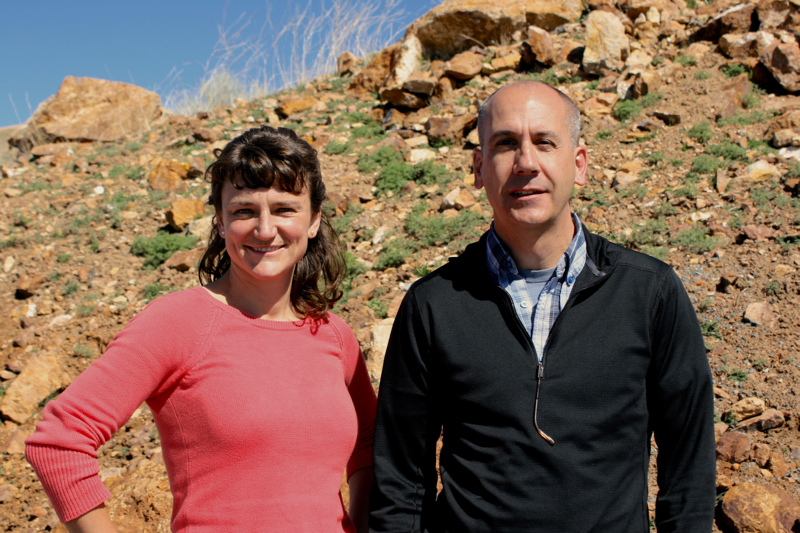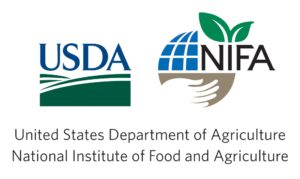Native Waters on Arid Lands Podcast
Episode 3: Building Research Partnerships with Meghan Collins and Dr. Richard Jasoni
In Episode 3 of the Native Waters on Arid Lands podcast, we speak with Meghan Collins and Dr. Richard Jasoni of the Desert Research Institute in Reno, NV about their work in developing a new faculty research partnership program.
Meghan is the Environmental Education Lead and Assistant Research Scientist – STEM Education at DRI. She works to support Science, Technology, Engineering and Mathematics (STEM) programs, experiential learning, and lifelong learning programs. Richard is an Associate Research Scientist in biology at DRI. He has a background in plant physiology and crop production, and works to understand environmental impacts on plant productivity.
Listen to the podcast and read below to learn more about Meghan, Richard and their work. You can also subscribe to our podcast on iTunes or Google Play.
Building research partnerships
As part of the Native Waters on Arid Lands project, Meghan and Richard are working to help build the capacity for scientific research at Tribal Colleges and Universities (TCUs) through a faculty research partnership program.
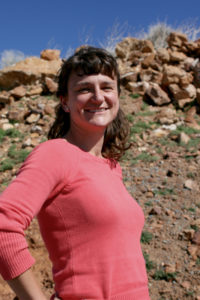
Meghan Collins
The program, which they are currently piloting with Aaniiih Nakoda College in Montana, will pair research faculty from DRI with faculty from TCUs in support of original student research projects. The idea for this program came about as a result of a survey conducted by the First Americans Land-Grant Consortium (FALCON). Survey findings showed that the lack of opportunity for original student research at TCUs prevented undergraduate students from gaining valuable skills that would help them continue on to graduate school.
To help build the capacity for scientific research at TCUs and provide opportunities for students, Meghan and Richard are now working in conjunction with FALCON on what they hope will be a good solution to this problem.
“We developed this idea of a faculty-to-faculty research partnership, where a research faculty member from here at the Desert Research Institute partners with a tribal faculty member,” Collins said. “They co-design a project which can be implemented on site at the TCU, and it can be used as an opportunity for the students to get involved to gain that research experience and the skills that they may want to use in their future careers.”
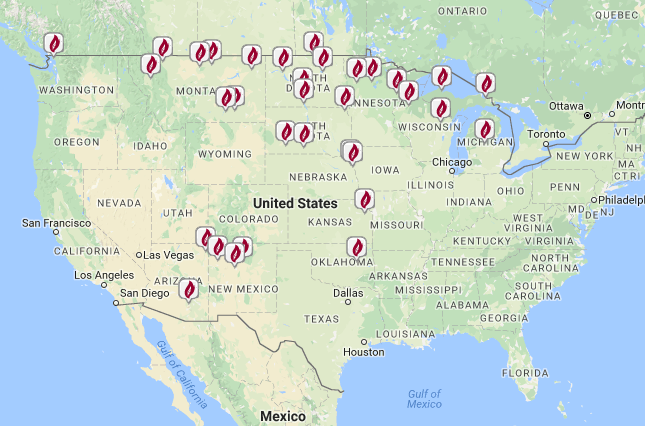
Map of Tribal Colleges and Universities from American Indian College Fund
Developing a pilot program
For the pilot run of the research partnership program, Richard — the research faculty partner from DRI — is working with Brian Grebliunas, a TCU faculty member from Aaniiih Nakoda College, to set up an irrigation experiment that will take place in the community garden on campus.
The pilot project will investigate the effects of water availability on crop production. Richard and Brian will work with a student researcher to examine the effects of different irrigation treatments (100%, and 25% or 50% of normal water application) on two crops (corn and lettuce) that have traditionally been grown in the community garden. The student will learn to install soil sensors, plant and measure crops, collect data, analyze soil samples in a lab, measure crop yield, interpret results, create graphs, write a final report, and more.
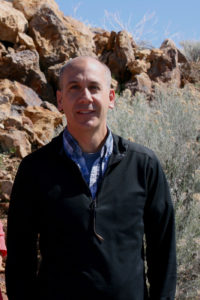
Dr. Richard Jasoni
Richard and Brian hope that the information produced by the pilot study will enhance our understanding of the impacts of trying to grow crops with less water. The results may also show the effects of reduced water treatments on crop yield — information that may be important to members of tribal communities who are trying to grow crops in arid lands.
“Everybody in arid lands struggles with water availability, it’s just kind of the nature of being in an arid environment,” Richard said. “So, how you manage that?…How do you handle years with less water?…And what kinds of things can you do agriculturally to maybe get around that — are there different planting strategies or different ways of irrigating, are there more efficient crops that you can use?”
Meghan and Richard also hope that the faculty research partnership program will be beneficial to both the faculty and students that are involved.
“I am hoping that the faculty partners can establish a more extensive network of research partners, and also more extensive program at their home university, if they choose to continue involving themselves in inquiry through research,” Meghan said. “For the students, I hope that they gain the skills also related to inquiry, that if they want to take that into their future careers or graduate school, that they are more empowered, having learned something from this research process.”
Additional resources
Native Waters on Arid Lands 2017 Tribal Summit – Youth Day
For students who are interested in getting involved with the Native Waters project, the 2017 Native Waters on Arid Lands Tribal Summit (to be held November 14-16, 2017 in Reno, NV) will include a Youth Day, focused on questions that are important to students. More information will be available prior to the Summit.
Stories in the Snow
Another project that may be of interest to students is a citizen science project organized by Meghan and other DRI researchers called Stories in the Snow. In this project, students collect data on atmospheric conditions in the Lake Tahoe/Truckee basin by taking closeup photographs of snowflakes with a smartphone. For more information, please visit the Stories in the Snow website or Facebook page.
Education and Outreach Programs at the Desert Research Institute
To learn more about education and outreach programs at DRI, please visit: http://www.dri.edu/education-and-outreach
Ecologically Controlled Enclosed Lysimeter Laboratories (EcoCELLS)
To find out more about the Desert Research Institute’s capabilities for controlled environment studies, please visit: https://www.dri.edu/earth-ecosystem-sciences/earth-eco-laboratories/1740-ecologically-controlled-enclosed-lysimeter-laboratories-ecocells
More, on the podcast
To learn more about Meghan and Richard’s work with the Native Waters on Arid Lands project, listen to podcast episode 3, below. Music for this podcast came from Podington Bear (song title: Bit Rio) on the Free Music Archive under a Creative Commons license. For a written transcript of this podcast, please contact [email protected].
Podcast: Play in new window | Download
Subscribe: RSS

